BMP6003: International HRM Report - UK Call Centres in Japan
VerifiedAdded on 2023/01/13
|11
|3374
|70
Report
AI Summary
This report delves into the intricacies of International Human Resource Management (IHRM), focusing on the challenges and opportunities faced by UK companies establishing call centers in Japan. It critically appraises the impact of culture on managerial decision-making, exploring the influence of cultural differences on staffing, training, and employee relations. The report examines the Hofstede model of cultural dimensions to analyze cultural disparities and their implications for IHRM practices. Furthermore, it evaluates the management of people as a business resource integral to international organizational strategies, emphasizing the importance of effective IHRM activities such as staffing, training, and performance management. The analysis highlights the significance of adapting to local cultural norms and developing strategies to ensure the success of international operations, offering insights into managing diverse workforces and fostering a productive work environment in a global context.
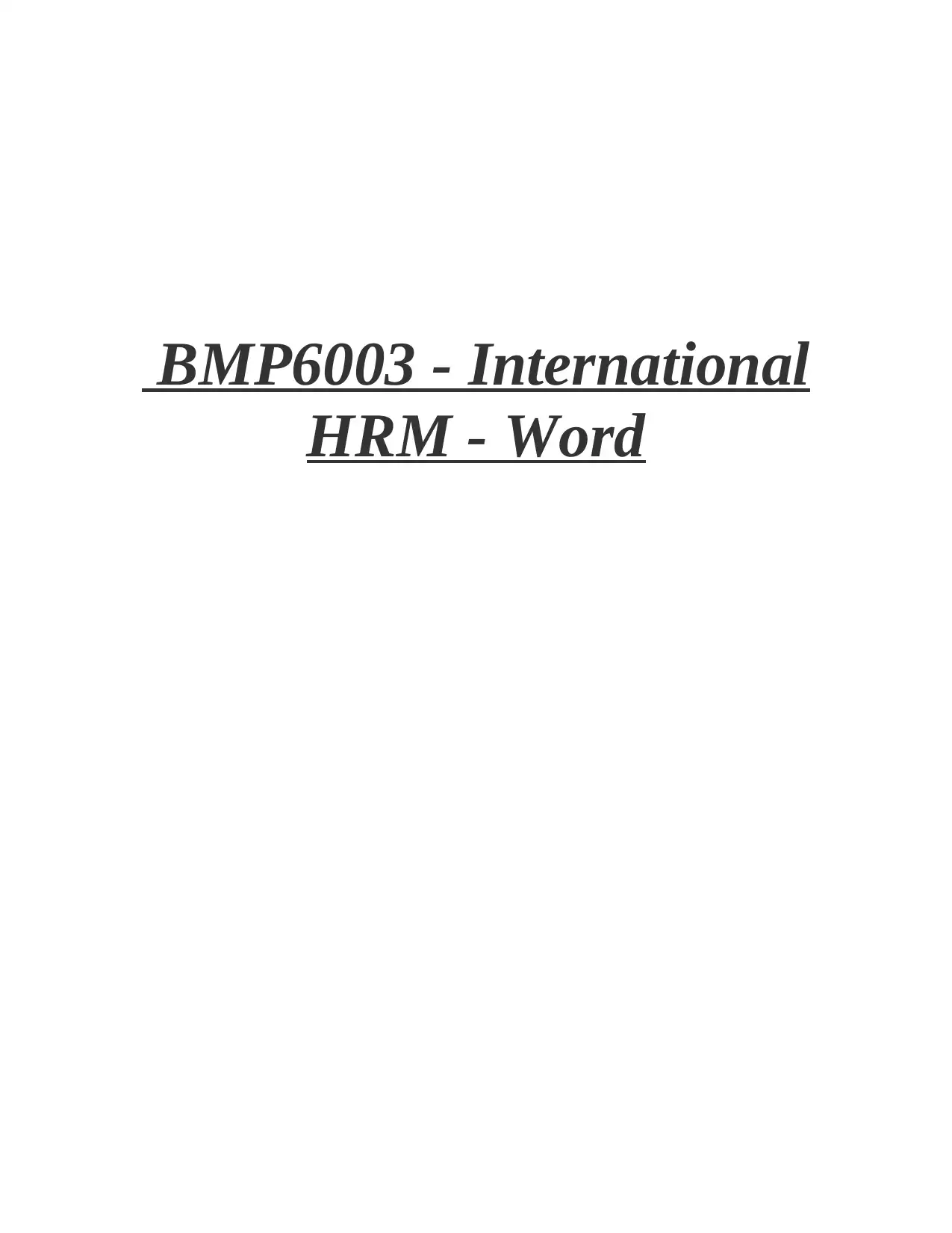
BMP6003 - International
HRM - Word
HRM - Word
Paraphrase This Document
Need a fresh take? Get an instant paraphrase of this document with our AI Paraphraser
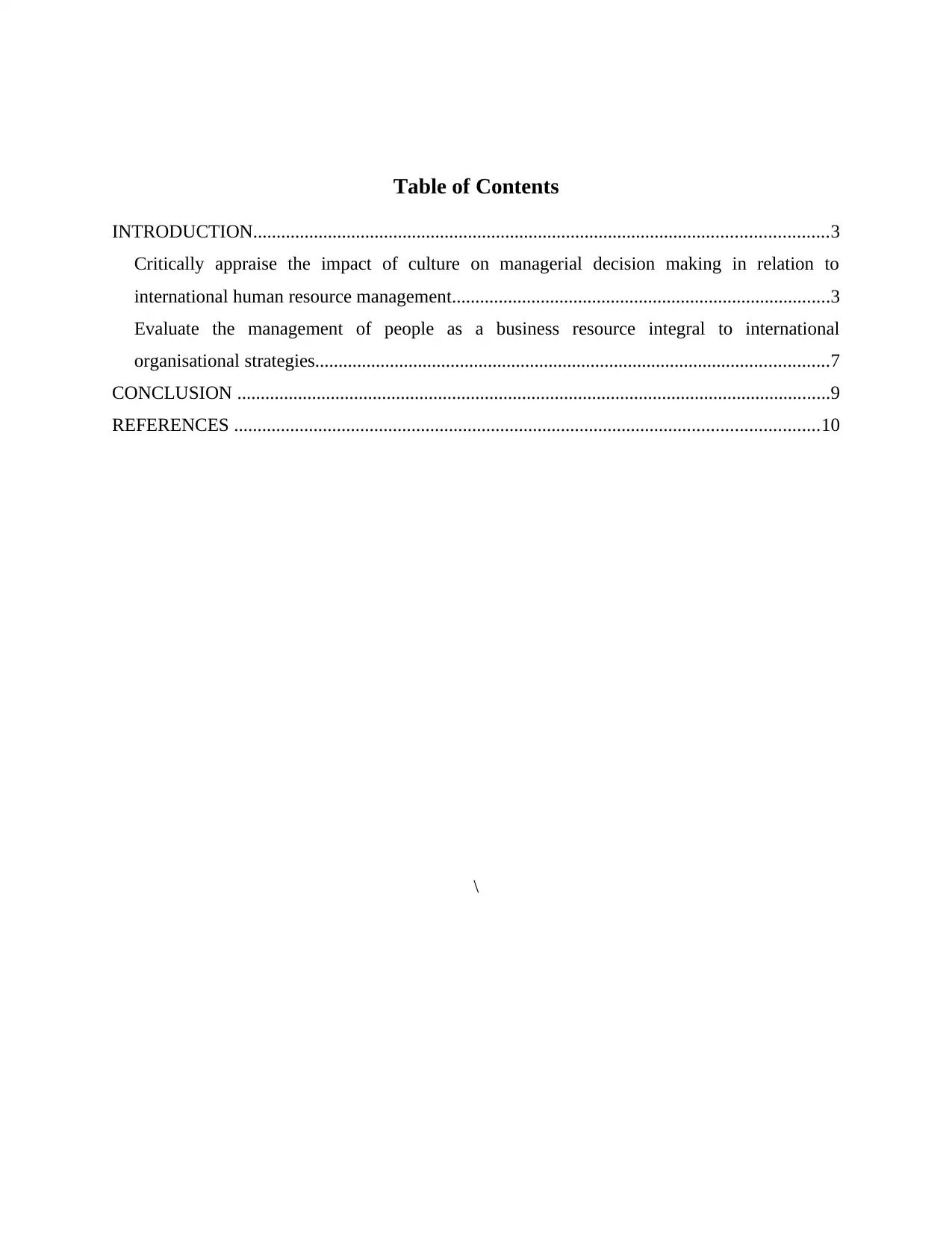
Table of Contents
INTRODUCTION...........................................................................................................................3
Critically appraise the impact of culture on managerial decision making in relation to
international human resource management.................................................................................3
Evaluate the management of people as a business resource integral to international
organisational strategies..............................................................................................................7
CONCLUSION ...............................................................................................................................9
REFERENCES .............................................................................................................................10
\
INTRODUCTION...........................................................................................................................3
Critically appraise the impact of culture on managerial decision making in relation to
international human resource management.................................................................................3
Evaluate the management of people as a business resource integral to international
organisational strategies..............................................................................................................7
CONCLUSION ...............................................................................................................................9
REFERENCES .............................................................................................................................10
\
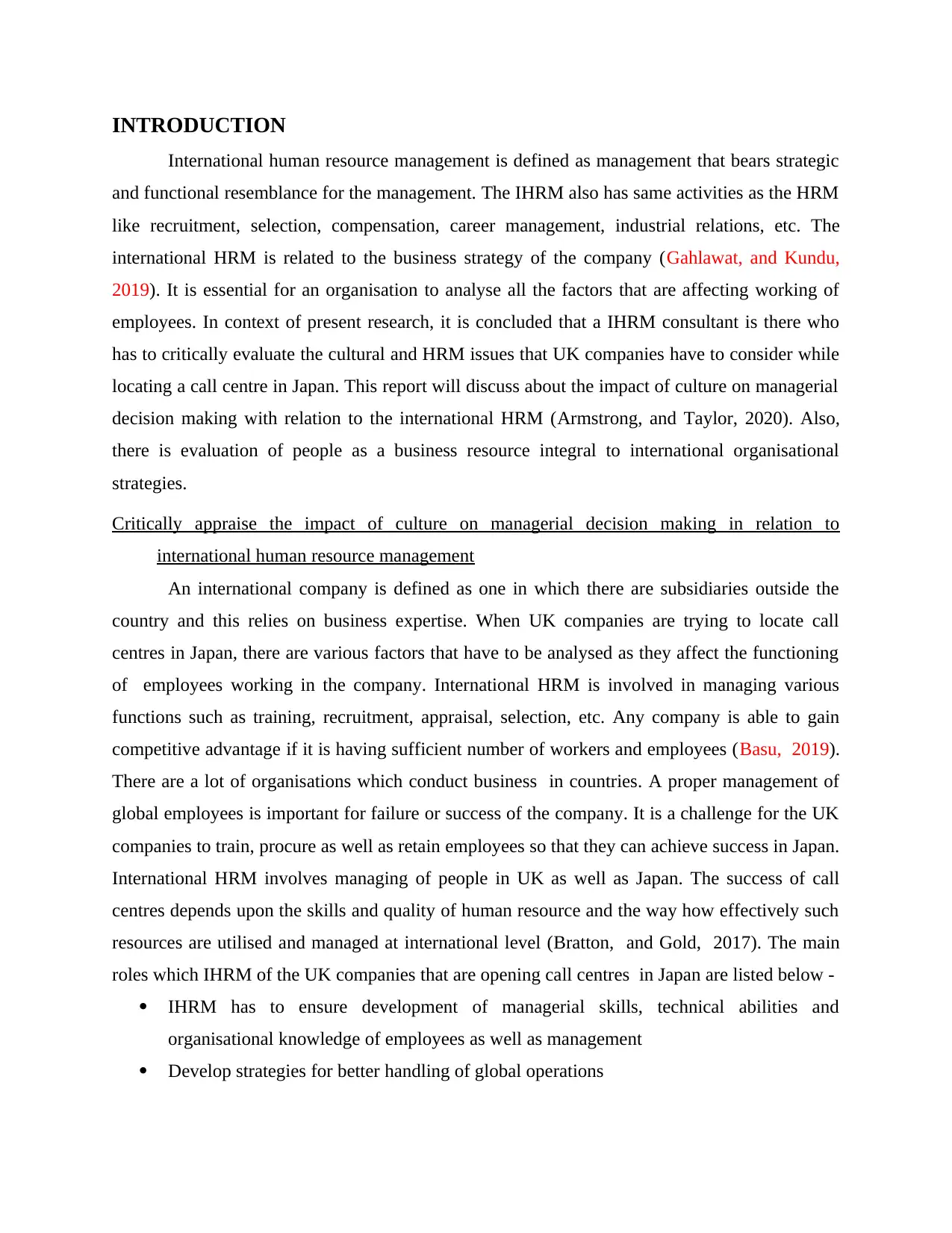
INTRODUCTION
International human resource management is defined as management that bears strategic
and functional resemblance for the management. The IHRM also has same activities as the HRM
like recruitment, selection, compensation, career management, industrial relations, etc. The
international HRM is related to the business strategy of the company (Gahlawat, and Kundu,
2019). It is essential for an organisation to analyse all the factors that are affecting working of
employees. In context of present research, it is concluded that a IHRM consultant is there who
has to critically evaluate the cultural and HRM issues that UK companies have to consider while
locating a call centre in Japan. This report will discuss about the impact of culture on managerial
decision making with relation to the international HRM (Armstrong, and Taylor, 2020). Also,
there is evaluation of people as a business resource integral to international organisational
strategies.
Critically appraise the impact of culture on managerial decision making in relation to
international human resource management
An international company is defined as one in which there are subsidiaries outside the
country and this relies on business expertise. When UK companies are trying to locate call
centres in Japan, there are various factors that have to be analysed as they affect the functioning
of employees working in the company. International HRM is involved in managing various
functions such as training, recruitment, appraisal, selection, etc. Any company is able to gain
competitive advantage if it is having sufficient number of workers and employees (Basu, 2019).
There are a lot of organisations which conduct business in countries. A proper management of
global employees is important for failure or success of the company. It is a challenge for the UK
companies to train, procure as well as retain employees so that they can achieve success in Japan.
International HRM involves managing of people in UK as well as Japan. The success of call
centres depends upon the skills and quality of human resource and the way how effectively such
resources are utilised and managed at international level (Bratton, and Gold, 2017). The main
roles which IHRM of the UK companies that are opening call centres in Japan are listed below -
IHRM has to ensure development of managerial skills, technical abilities and
organisational knowledge of employees as well as management
Develop strategies for better handling of global operations
International human resource management is defined as management that bears strategic
and functional resemblance for the management. The IHRM also has same activities as the HRM
like recruitment, selection, compensation, career management, industrial relations, etc. The
international HRM is related to the business strategy of the company (Gahlawat, and Kundu,
2019). It is essential for an organisation to analyse all the factors that are affecting working of
employees. In context of present research, it is concluded that a IHRM consultant is there who
has to critically evaluate the cultural and HRM issues that UK companies have to consider while
locating a call centre in Japan. This report will discuss about the impact of culture on managerial
decision making with relation to the international HRM (Armstrong, and Taylor, 2020). Also,
there is evaluation of people as a business resource integral to international organisational
strategies.
Critically appraise the impact of culture on managerial decision making in relation to
international human resource management
An international company is defined as one in which there are subsidiaries outside the
country and this relies on business expertise. When UK companies are trying to locate call
centres in Japan, there are various factors that have to be analysed as they affect the functioning
of employees working in the company. International HRM is involved in managing various
functions such as training, recruitment, appraisal, selection, etc. Any company is able to gain
competitive advantage if it is having sufficient number of workers and employees (Basu, 2019).
There are a lot of organisations which conduct business in countries. A proper management of
global employees is important for failure or success of the company. It is a challenge for the UK
companies to train, procure as well as retain employees so that they can achieve success in Japan.
International HRM involves managing of people in UK as well as Japan. The success of call
centres depends upon the skills and quality of human resource and the way how effectively such
resources are utilised and managed at international level (Bratton, and Gold, 2017). The main
roles which IHRM of the UK companies that are opening call centres in Japan are listed below -
IHRM has to ensure development of managerial skills, technical abilities and
organisational knowledge of employees as well as management
Develop strategies for better handling of global operations
⊘ This is a preview!⊘
Do you want full access?
Subscribe today to unlock all pages.

Trusted by 1+ million students worldwide
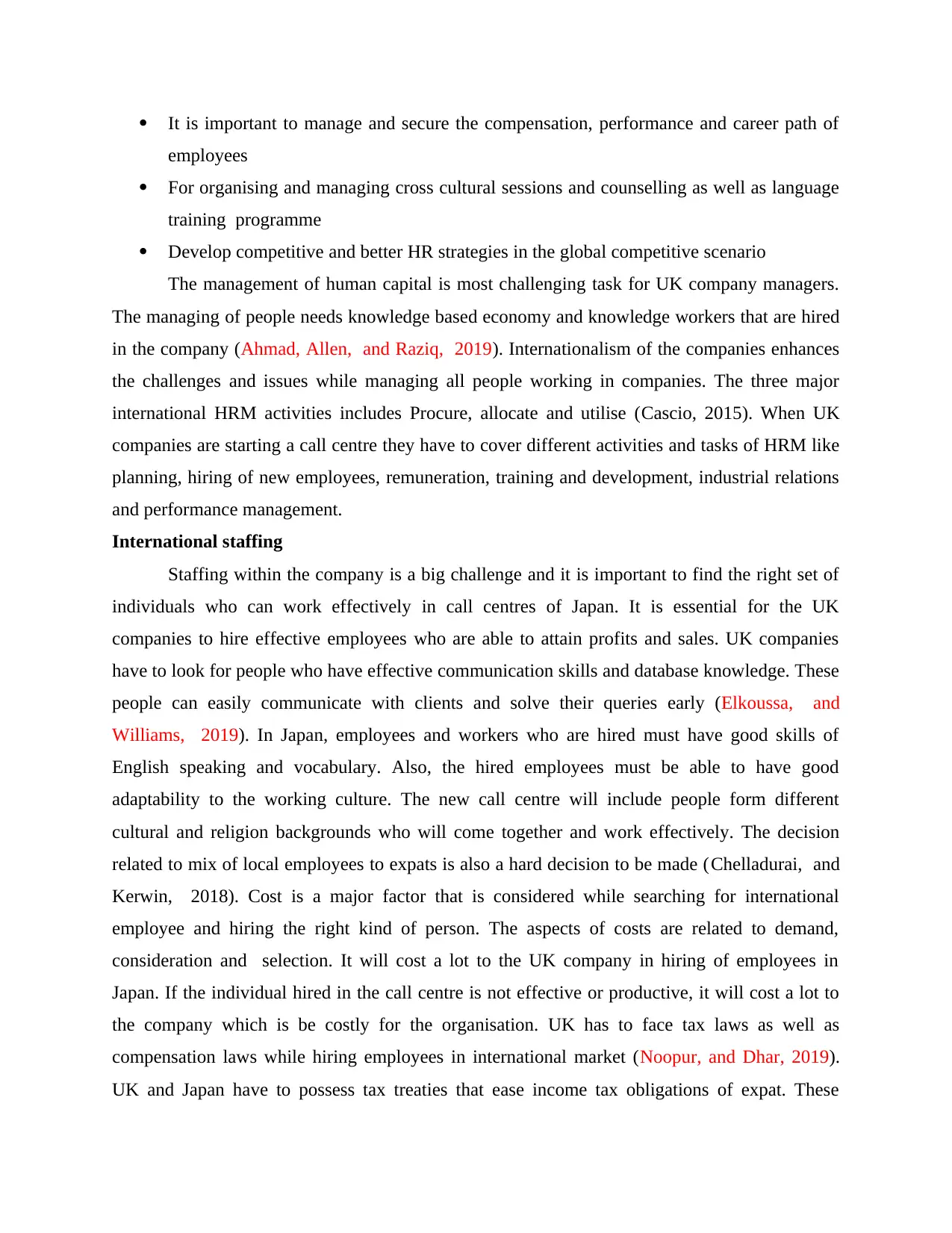
It is important to manage and secure the compensation, performance and career path of
employees
For organising and managing cross cultural sessions and counselling as well as language
training programme
Develop competitive and better HR strategies in the global competitive scenario
The management of human capital is most challenging task for UK company managers.
The managing of people needs knowledge based economy and knowledge workers that are hired
in the company (Ahmad, Allen, and Raziq, 2019). Internationalism of the companies enhances
the challenges and issues while managing all people working in companies. The three major
international HRM activities includes Procure, allocate and utilise (Cascio, 2015). When UK
companies are starting a call centre they have to cover different activities and tasks of HRM like
planning, hiring of new employees, remuneration, training and development, industrial relations
and performance management.
International staffing
Staffing within the company is a big challenge and it is important to find the right set of
individuals who can work effectively in call centres of Japan. It is essential for the UK
companies to hire effective employees who are able to attain profits and sales. UK companies
have to look for people who have effective communication skills and database knowledge. These
people can easily communicate with clients and solve their queries early (Elkoussa, and
Williams, 2019). In Japan, employees and workers who are hired must have good skills of
English speaking and vocabulary. Also, the hired employees must be able to have good
adaptability to the working culture. The new call centre will include people form different
cultural and religion backgrounds who will come together and work effectively. The decision
related to mix of local employees to expats is also a hard decision to be made (Chelladurai, and
Kerwin, 2018). Cost is a major factor that is considered while searching for international
employee and hiring the right kind of person. The aspects of costs are related to demand,
consideration and selection. It will cost a lot to the UK company in hiring of employees in
Japan. If the individual hired in the call centre is not effective or productive, it will cost a lot to
the company which is be costly for the organisation. UK has to face tax laws as well as
compensation laws while hiring employees in international market (Noopur, and Dhar, 2019).
UK and Japan have to possess tax treaties that ease income tax obligations of expat. These
employees
For organising and managing cross cultural sessions and counselling as well as language
training programme
Develop competitive and better HR strategies in the global competitive scenario
The management of human capital is most challenging task for UK company managers.
The managing of people needs knowledge based economy and knowledge workers that are hired
in the company (Ahmad, Allen, and Raziq, 2019). Internationalism of the companies enhances
the challenges and issues while managing all people working in companies. The three major
international HRM activities includes Procure, allocate and utilise (Cascio, 2015). When UK
companies are starting a call centre they have to cover different activities and tasks of HRM like
planning, hiring of new employees, remuneration, training and development, industrial relations
and performance management.
International staffing
Staffing within the company is a big challenge and it is important to find the right set of
individuals who can work effectively in call centres of Japan. It is essential for the UK
companies to hire effective employees who are able to attain profits and sales. UK companies
have to look for people who have effective communication skills and database knowledge. These
people can easily communicate with clients and solve their queries early (Elkoussa, and
Williams, 2019). In Japan, employees and workers who are hired must have good skills of
English speaking and vocabulary. Also, the hired employees must be able to have good
adaptability to the working culture. The new call centre will include people form different
cultural and religion backgrounds who will come together and work effectively. The decision
related to mix of local employees to expats is also a hard decision to be made (Chelladurai, and
Kerwin, 2018). Cost is a major factor that is considered while searching for international
employee and hiring the right kind of person. The aspects of costs are related to demand,
consideration and selection. It will cost a lot to the UK company in hiring of employees in
Japan. If the individual hired in the call centre is not effective or productive, it will cost a lot to
the company which is be costly for the organisation. UK has to face tax laws as well as
compensation laws while hiring employees in international market (Noopur, and Dhar, 2019).
UK and Japan have to possess tax treaties that ease income tax obligations of expat. These
Paraphrase This Document
Need a fresh take? Get an instant paraphrase of this document with our AI Paraphraser
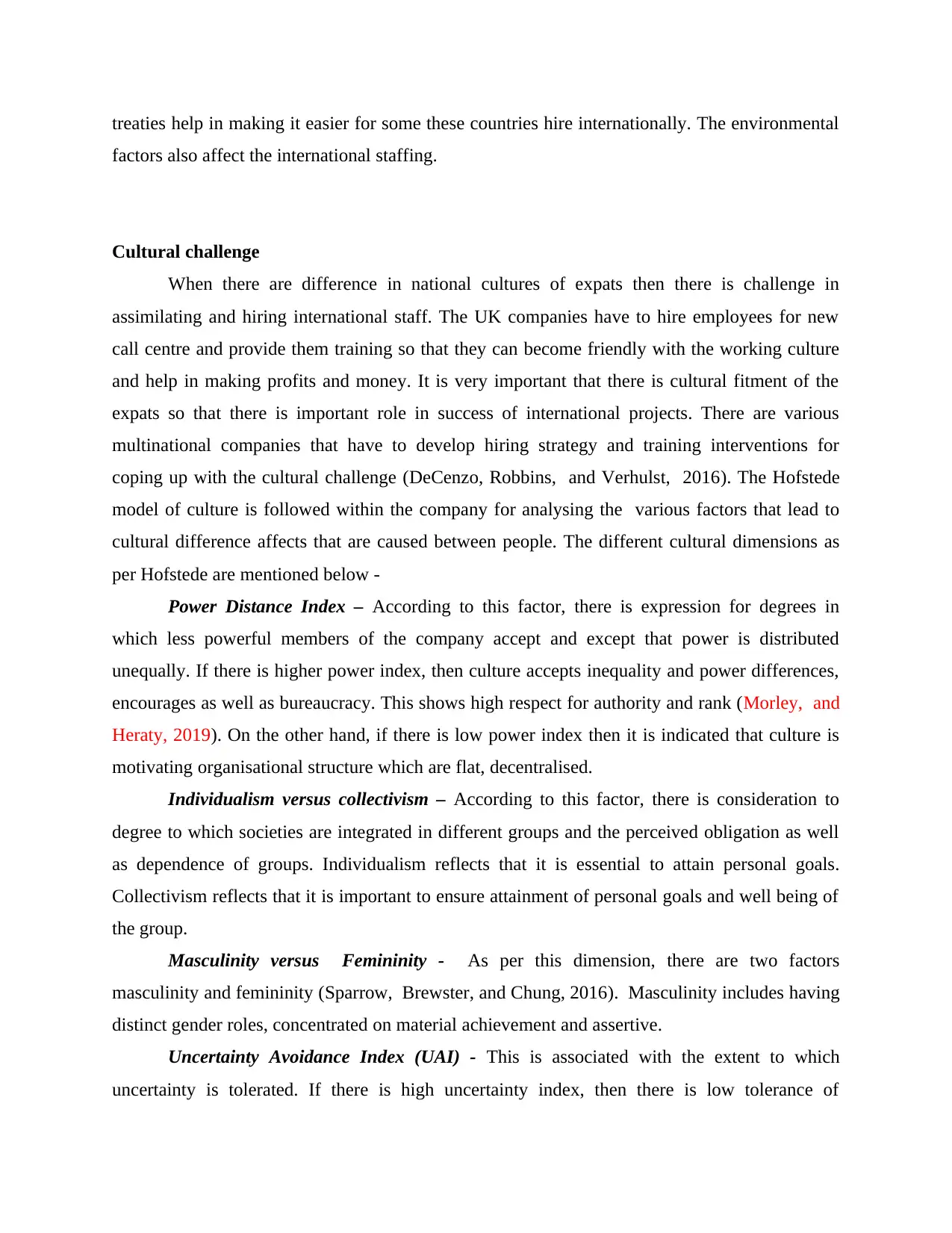
treaties help in making it easier for some these countries hire internationally. The environmental
factors also affect the international staffing.
Cultural challenge
When there are difference in national cultures of expats then there is challenge in
assimilating and hiring international staff. The UK companies have to hire employees for new
call centre and provide them training so that they can become friendly with the working culture
and help in making profits and money. It is very important that there is cultural fitment of the
expats so that there is important role in success of international projects. There are various
multinational companies that have to develop hiring strategy and training interventions for
coping up with the cultural challenge (DeCenzo, Robbins, and Verhulst, 2016). The Hofstede
model of culture is followed within the company for analysing the various factors that lead to
cultural difference affects that are caused between people. The different cultural dimensions as
per Hofstede are mentioned below -
Power Distance Index – According to this factor, there is expression for degrees in
which less powerful members of the company accept and except that power is distributed
unequally. If there is higher power index, then culture accepts inequality and power differences,
encourages as well as bureaucracy. This shows high respect for authority and rank (Morley, and
Heraty, 2019). On the other hand, if there is low power index then it is indicated that culture is
motivating organisational structure which are flat, decentralised.
Individualism versus collectivism – According to this factor, there is consideration to
degree to which societies are integrated in different groups and the perceived obligation as well
as dependence of groups. Individualism reflects that it is essential to attain personal goals.
Collectivism reflects that it is important to ensure attainment of personal goals and well being of
the group.
Masculinity versus Femininity - As per this dimension, there are two factors
masculinity and femininity (Sparrow, Brewster, and Chung, 2016). Masculinity includes having
distinct gender roles, concentrated on material achievement and assertive.
Uncertainty Avoidance Index (UAI) - This is associated with the extent to which
uncertainty is tolerated. If there is high uncertainty index, then there is low tolerance of
factors also affect the international staffing.
Cultural challenge
When there are difference in national cultures of expats then there is challenge in
assimilating and hiring international staff. The UK companies have to hire employees for new
call centre and provide them training so that they can become friendly with the working culture
and help in making profits and money. It is very important that there is cultural fitment of the
expats so that there is important role in success of international projects. There are various
multinational companies that have to develop hiring strategy and training interventions for
coping up with the cultural challenge (DeCenzo, Robbins, and Verhulst, 2016). The Hofstede
model of culture is followed within the company for analysing the various factors that lead to
cultural difference affects that are caused between people. The different cultural dimensions as
per Hofstede are mentioned below -
Power Distance Index – According to this factor, there is expression for degrees in
which less powerful members of the company accept and except that power is distributed
unequally. If there is higher power index, then culture accepts inequality and power differences,
encourages as well as bureaucracy. This shows high respect for authority and rank (Morley, and
Heraty, 2019). On the other hand, if there is low power index then it is indicated that culture is
motivating organisational structure which are flat, decentralised.
Individualism versus collectivism – According to this factor, there is consideration to
degree to which societies are integrated in different groups and the perceived obligation as well
as dependence of groups. Individualism reflects that it is essential to attain personal goals.
Collectivism reflects that it is important to ensure attainment of personal goals and well being of
the group.
Masculinity versus Femininity - As per this dimension, there are two factors
masculinity and femininity (Sparrow, Brewster, and Chung, 2016). Masculinity includes having
distinct gender roles, concentrated on material achievement and assertive.
Uncertainty Avoidance Index (UAI) - This is associated with the extent to which
uncertainty is tolerated. If there is high uncertainty index, then there is low tolerance of
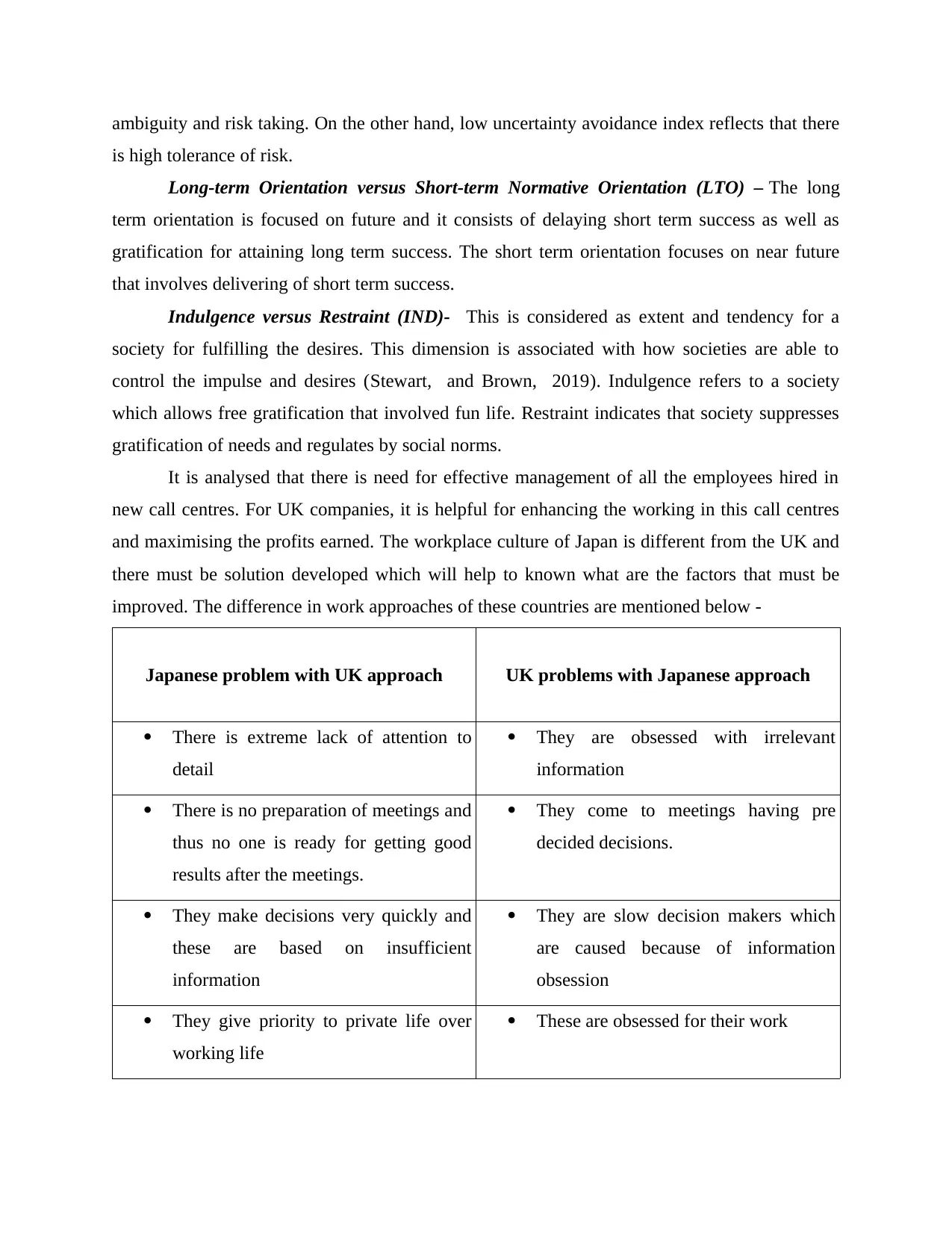
ambiguity and risk taking. On the other hand, low uncertainty avoidance index reflects that there
is high tolerance of risk.
Long-term Orientation versus Short-term Normative Orientation (LTO) – The long
term orientation is focused on future and it consists of delaying short term success as well as
gratification for attaining long term success. The short term orientation focuses on near future
that involves delivering of short term success.
Indulgence versus Restraint (IND)- This is considered as extent and tendency for a
society for fulfilling the desires. This dimension is associated with how societies are able to
control the impulse and desires (Stewart, and Brown, 2019). Indulgence refers to a society
which allows free gratification that involved fun life. Restraint indicates that society suppresses
gratification of needs and regulates by social norms.
It is analysed that there is need for effective management of all the employees hired in
new call centres. For UK companies, it is helpful for enhancing the working in this call centres
and maximising the profits earned. The workplace culture of Japan is different from the UK and
there must be solution developed which will help to known what are the factors that must be
improved. The difference in work approaches of these countries are mentioned below -
Japanese problem with UK approach UK problems with Japanese approach
There is extreme lack of attention to
detail
They are obsessed with irrelevant
information
There is no preparation of meetings and
thus no one is ready for getting good
results after the meetings.
They come to meetings having pre
decided decisions.
They make decisions very quickly and
these are based on insufficient
information
They are slow decision makers which
are caused because of information
obsession
They give priority to private life over
working life
These are obsessed for their work
is high tolerance of risk.
Long-term Orientation versus Short-term Normative Orientation (LTO) – The long
term orientation is focused on future and it consists of delaying short term success as well as
gratification for attaining long term success. The short term orientation focuses on near future
that involves delivering of short term success.
Indulgence versus Restraint (IND)- This is considered as extent and tendency for a
society for fulfilling the desires. This dimension is associated with how societies are able to
control the impulse and desires (Stewart, and Brown, 2019). Indulgence refers to a society
which allows free gratification that involved fun life. Restraint indicates that society suppresses
gratification of needs and regulates by social norms.
It is analysed that there is need for effective management of all the employees hired in
new call centres. For UK companies, it is helpful for enhancing the working in this call centres
and maximising the profits earned. The workplace culture of Japan is different from the UK and
there must be solution developed which will help to known what are the factors that must be
improved. The difference in work approaches of these countries are mentioned below -
Japanese problem with UK approach UK problems with Japanese approach
There is extreme lack of attention to
detail
They are obsessed with irrelevant
information
There is no preparation of meetings and
thus no one is ready for getting good
results after the meetings.
They come to meetings having pre
decided decisions.
They make decisions very quickly and
these are based on insufficient
information
They are slow decision makers which
are caused because of information
obsession
They give priority to private life over
working life
These are obsessed for their work
⊘ This is a preview!⊘
Do you want full access?
Subscribe today to unlock all pages.

Trusted by 1+ million students worldwide
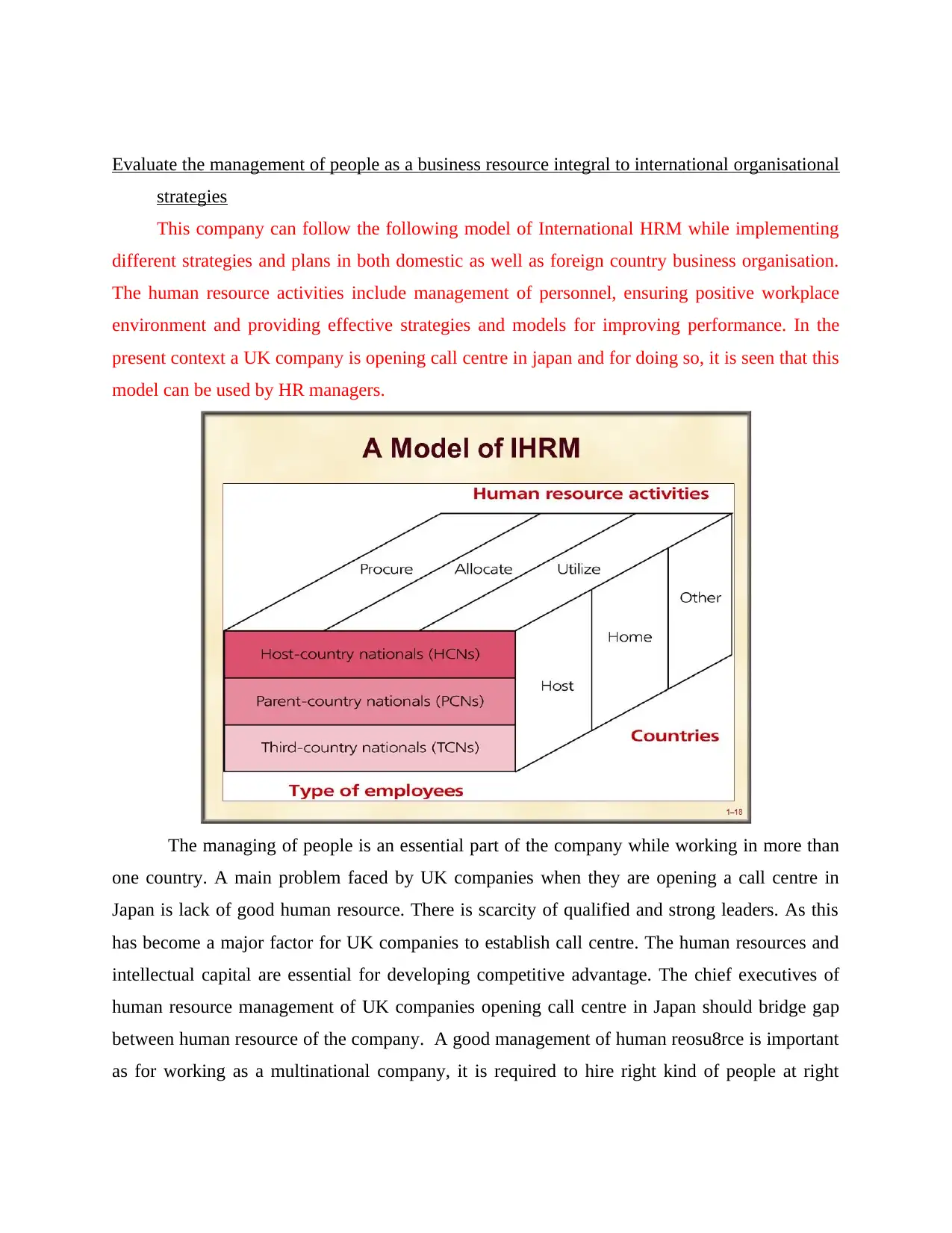
Evaluate the management of people as a business resource integral to international organisational
strategies
This company can follow the following model of International HRM while implementing
different strategies and plans in both domestic as well as foreign country business organisation.
The human resource activities include management of personnel, ensuring positive workplace
environment and providing effective strategies and models for improving performance. In the
present context a UK company is opening call centre in japan and for doing so, it is seen that this
model can be used by HR managers.
The managing of people is an essential part of the company while working in more than
one country. A main problem faced by UK companies when they are opening a call centre in
Japan is lack of good human resource. There is scarcity of qualified and strong leaders. As this
has become a major factor for UK companies to establish call centre. The human resources and
intellectual capital are essential for developing competitive advantage. The chief executives of
human resource management of UK companies opening call centre in Japan should bridge gap
between human resource of the company. A good management of human reosu8rce is important
as for working as a multinational company, it is required to hire right kind of people at right
strategies
This company can follow the following model of International HRM while implementing
different strategies and plans in both domestic as well as foreign country business organisation.
The human resource activities include management of personnel, ensuring positive workplace
environment and providing effective strategies and models for improving performance. In the
present context a UK company is opening call centre in japan and for doing so, it is seen that this
model can be used by HR managers.
The managing of people is an essential part of the company while working in more than
one country. A main problem faced by UK companies when they are opening a call centre in
Japan is lack of good human resource. There is scarcity of qualified and strong leaders. As this
has become a major factor for UK companies to establish call centre. The human resources and
intellectual capital are essential for developing competitive advantage. The chief executives of
human resource management of UK companies opening call centre in Japan should bridge gap
between human resource of the company. A good management of human reosu8rce is important
as for working as a multinational company, it is required to hire right kind of people at right
Paraphrase This Document
Need a fresh take? Get an instant paraphrase of this document with our AI Paraphraser
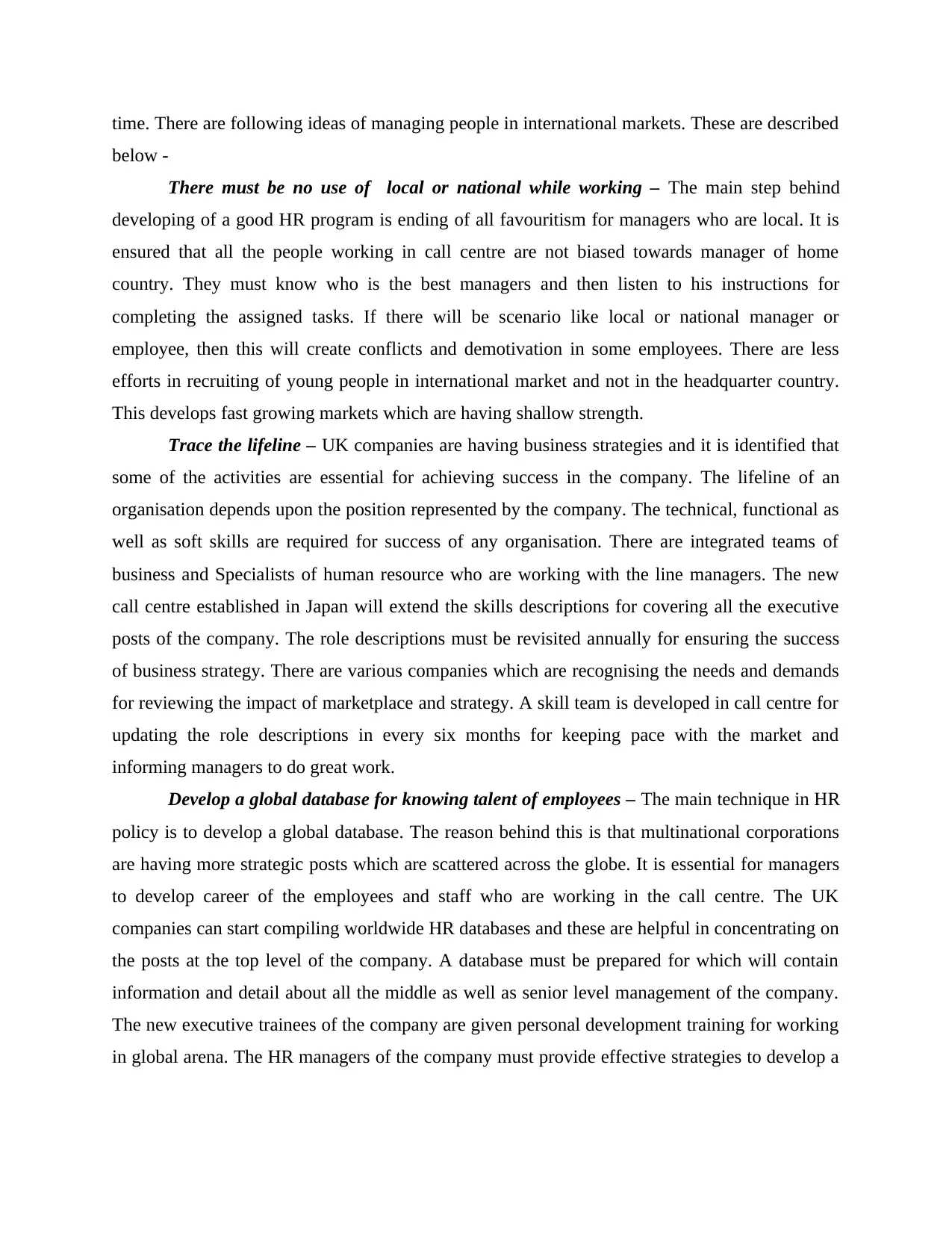
time. There are following ideas of managing people in international markets. These are described
below -
There must be no use of local or national while working – The main step behind
developing of a good HR program is ending of all favouritism for managers who are local. It is
ensured that all the people working in call centre are not biased towards manager of home
country. They must know who is the best managers and then listen to his instructions for
completing the assigned tasks. If there will be scenario like local or national manager or
employee, then this will create conflicts and demotivation in some employees. There are less
efforts in recruiting of young people in international market and not in the headquarter country.
This develops fast growing markets which are having shallow strength.
Trace the lifeline – UK companies are having business strategies and it is identified that
some of the activities are essential for achieving success in the company. The lifeline of an
organisation depends upon the position represented by the company. The technical, functional as
well as soft skills are required for success of any organisation. There are integrated teams of
business and Specialists of human resource who are working with the line managers. The new
call centre established in Japan will extend the skills descriptions for covering all the executive
posts of the company. The role descriptions must be revisited annually for ensuring the success
of business strategy. There are various companies which are recognising the needs and demands
for reviewing the impact of marketplace and strategy. A skill team is developed in call centre for
updating the role descriptions in every six months for keeping pace with the market and
informing managers to do great work.
Develop a global database for knowing talent of employees – The main technique in HR
policy is to develop a global database. The reason behind this is that multinational corporations
are having more strategic posts which are scattered across the globe. It is essential for managers
to develop career of the employees and staff who are working in the call centre. The UK
companies can start compiling worldwide HR databases and these are helpful in concentrating on
the posts at the top level of the company. A database must be prepared for which will contain
information and detail about all the middle as well as senior level management of the company.
The new executive trainees of the company are given personal development training for working
in global arena. The HR managers of the company must provide effective strategies to develop a
below -
There must be no use of local or national while working – The main step behind
developing of a good HR program is ending of all favouritism for managers who are local. It is
ensured that all the people working in call centre are not biased towards manager of home
country. They must know who is the best managers and then listen to his instructions for
completing the assigned tasks. If there will be scenario like local or national manager or
employee, then this will create conflicts and demotivation in some employees. There are less
efforts in recruiting of young people in international market and not in the headquarter country.
This develops fast growing markets which are having shallow strength.
Trace the lifeline – UK companies are having business strategies and it is identified that
some of the activities are essential for achieving success in the company. The lifeline of an
organisation depends upon the position represented by the company. The technical, functional as
well as soft skills are required for success of any organisation. There are integrated teams of
business and Specialists of human resource who are working with the line managers. The new
call centre established in Japan will extend the skills descriptions for covering all the executive
posts of the company. The role descriptions must be revisited annually for ensuring the success
of business strategy. There are various companies which are recognising the needs and demands
for reviewing the impact of marketplace and strategy. A skill team is developed in call centre for
updating the role descriptions in every six months for keeping pace with the market and
informing managers to do great work.
Develop a global database for knowing talent of employees – The main technique in HR
policy is to develop a global database. The reason behind this is that multinational corporations
are having more strategic posts which are scattered across the globe. It is essential for managers
to develop career of the employees and staff who are working in the call centre. The UK
companies can start compiling worldwide HR databases and these are helpful in concentrating on
the posts at the top level of the company. A database must be prepared for which will contain
information and detail about all the middle as well as senior level management of the company.
The new executive trainees of the company are given personal development training for working
in global arena. The HR managers of the company must provide effective strategies to develop a
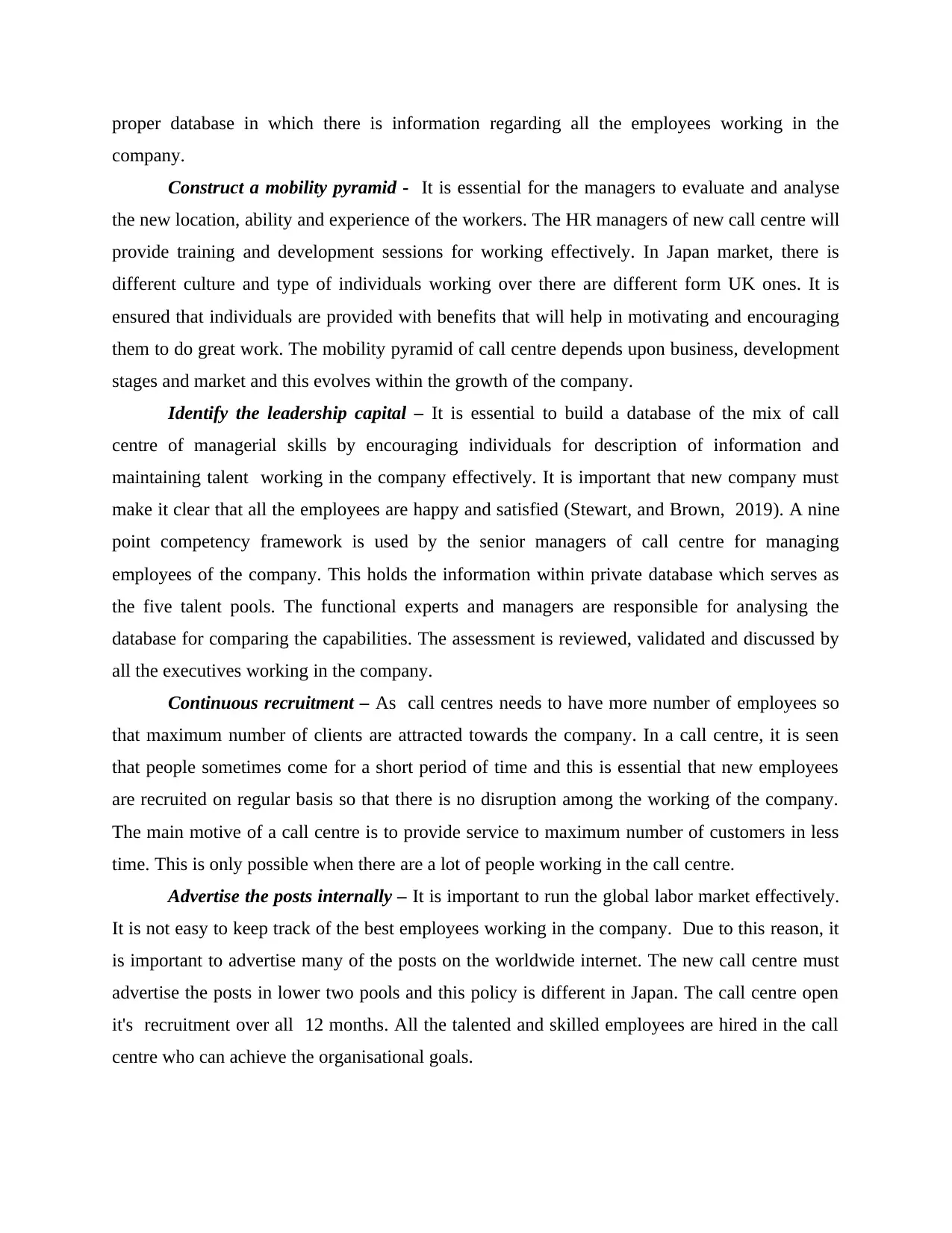
proper database in which there is information regarding all the employees working in the
company.
Construct a mobility pyramid - It is essential for the managers to evaluate and analyse
the new location, ability and experience of the workers. The HR managers of new call centre will
provide training and development sessions for working effectively. In Japan market, there is
different culture and type of individuals working over there are different form UK ones. It is
ensured that individuals are provided with benefits that will help in motivating and encouraging
them to do great work. The mobility pyramid of call centre depends upon business, development
stages and market and this evolves within the growth of the company.
Identify the leadership capital – It is essential to build a database of the mix of call
centre of managerial skills by encouraging individuals for description of information and
maintaining talent working in the company effectively. It is important that new company must
make it clear that all the employees are happy and satisfied (Stewart, and Brown, 2019). A nine
point competency framework is used by the senior managers of call centre for managing
employees of the company. This holds the information within private database which serves as
the five talent pools. The functional experts and managers are responsible for analysing the
database for comparing the capabilities. The assessment is reviewed, validated and discussed by
all the executives working in the company.
Continuous recruitment – As call centres needs to have more number of employees so
that maximum number of clients are attracted towards the company. In a call centre, it is seen
that people sometimes come for a short period of time and this is essential that new employees
are recruited on regular basis so that there is no disruption among the working of the company.
The main motive of a call centre is to provide service to maximum number of customers in less
time. This is only possible when there are a lot of people working in the call centre.
Advertise the posts internally – It is important to run the global labor market effectively.
It is not easy to keep track of the best employees working in the company. Due to this reason, it
is important to advertise many of the posts on the worldwide internet. The new call centre must
advertise the posts in lower two pools and this policy is different in Japan. The call centre open
it's recruitment over all 12 months. All the talented and skilled employees are hired in the call
centre who can achieve the organisational goals.
company.
Construct a mobility pyramid - It is essential for the managers to evaluate and analyse
the new location, ability and experience of the workers. The HR managers of new call centre will
provide training and development sessions for working effectively. In Japan market, there is
different culture and type of individuals working over there are different form UK ones. It is
ensured that individuals are provided with benefits that will help in motivating and encouraging
them to do great work. The mobility pyramid of call centre depends upon business, development
stages and market and this evolves within the growth of the company.
Identify the leadership capital – It is essential to build a database of the mix of call
centre of managerial skills by encouraging individuals for description of information and
maintaining talent working in the company effectively. It is important that new company must
make it clear that all the employees are happy and satisfied (Stewart, and Brown, 2019). A nine
point competency framework is used by the senior managers of call centre for managing
employees of the company. This holds the information within private database which serves as
the five talent pools. The functional experts and managers are responsible for analysing the
database for comparing the capabilities. The assessment is reviewed, validated and discussed by
all the executives working in the company.
Continuous recruitment – As call centres needs to have more number of employees so
that maximum number of clients are attracted towards the company. In a call centre, it is seen
that people sometimes come for a short period of time and this is essential that new employees
are recruited on regular basis so that there is no disruption among the working of the company.
The main motive of a call centre is to provide service to maximum number of customers in less
time. This is only possible when there are a lot of people working in the call centre.
Advertise the posts internally – It is important to run the global labor market effectively.
It is not easy to keep track of the best employees working in the company. Due to this reason, it
is important to advertise many of the posts on the worldwide internet. The new call centre must
advertise the posts in lower two pools and this policy is different in Japan. The call centre open
it's recruitment over all 12 months. All the talented and skilled employees are hired in the call
centre who can achieve the organisational goals.
⊘ This is a preview!⊘
Do you want full access?
Subscribe today to unlock all pages.

Trusted by 1+ million students worldwide
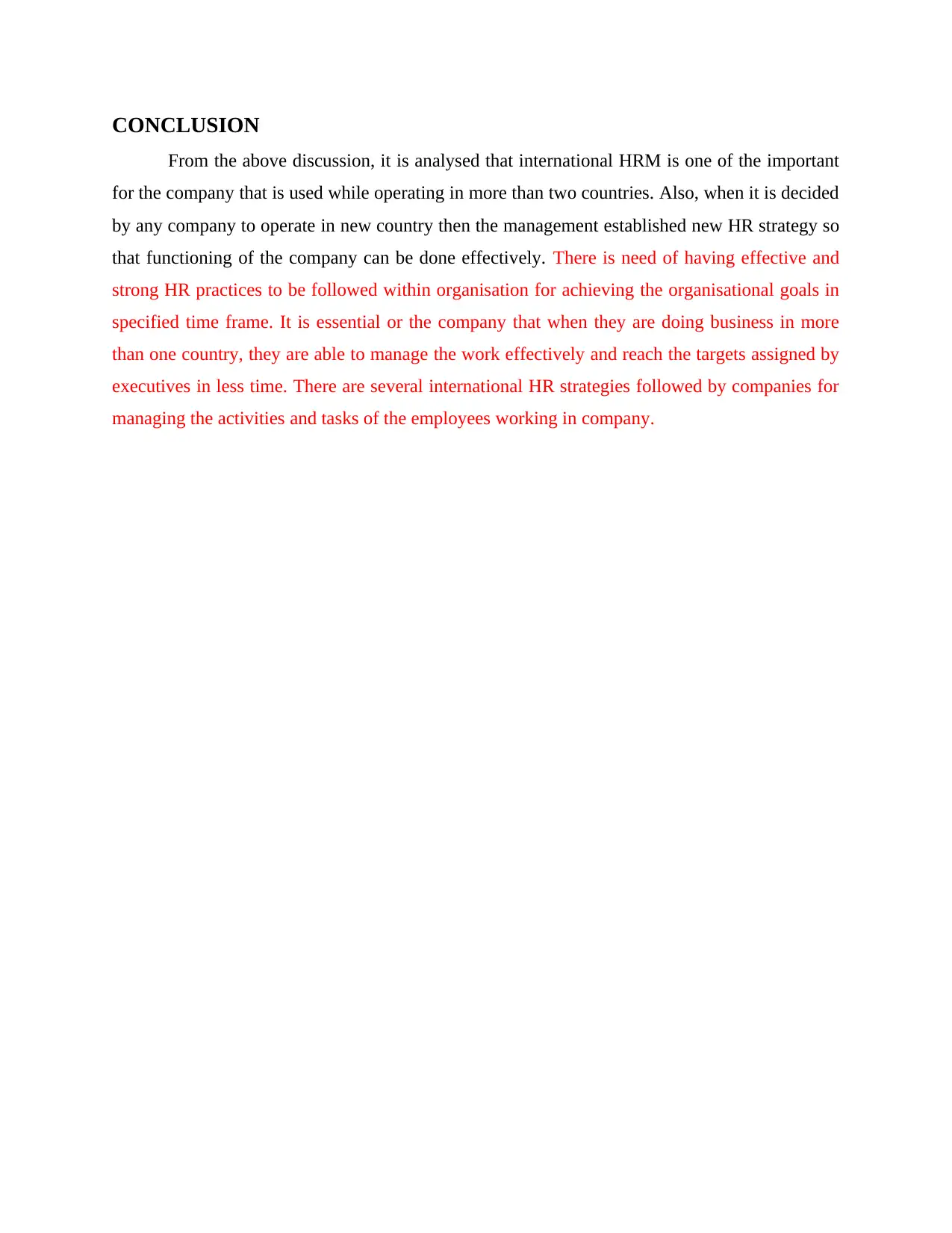
CONCLUSION
From the above discussion, it is analysed that international HRM is one of the important
for the company that is used while operating in more than two countries. Also, when it is decided
by any company to operate in new country then the management established new HR strategy so
that functioning of the company can be done effectively. There is need of having effective and
strong HR practices to be followed within organisation for achieving the organisational goals in
specified time frame. It is essential or the company that when they are doing business in more
than one country, they are able to manage the work effectively and reach the targets assigned by
executives in less time. There are several international HR strategies followed by companies for
managing the activities and tasks of the employees working in company.
From the above discussion, it is analysed that international HRM is one of the important
for the company that is used while operating in more than two countries. Also, when it is decided
by any company to operate in new country then the management established new HR strategy so
that functioning of the company can be done effectively. There is need of having effective and
strong HR practices to be followed within organisation for achieving the organisational goals in
specified time frame. It is essential or the company that when they are doing business in more
than one country, they are able to manage the work effectively and reach the targets assigned by
executives in less time. There are several international HR strategies followed by companies for
managing the activities and tasks of the employees working in company.
Paraphrase This Document
Need a fresh take? Get an instant paraphrase of this document with our AI Paraphraser
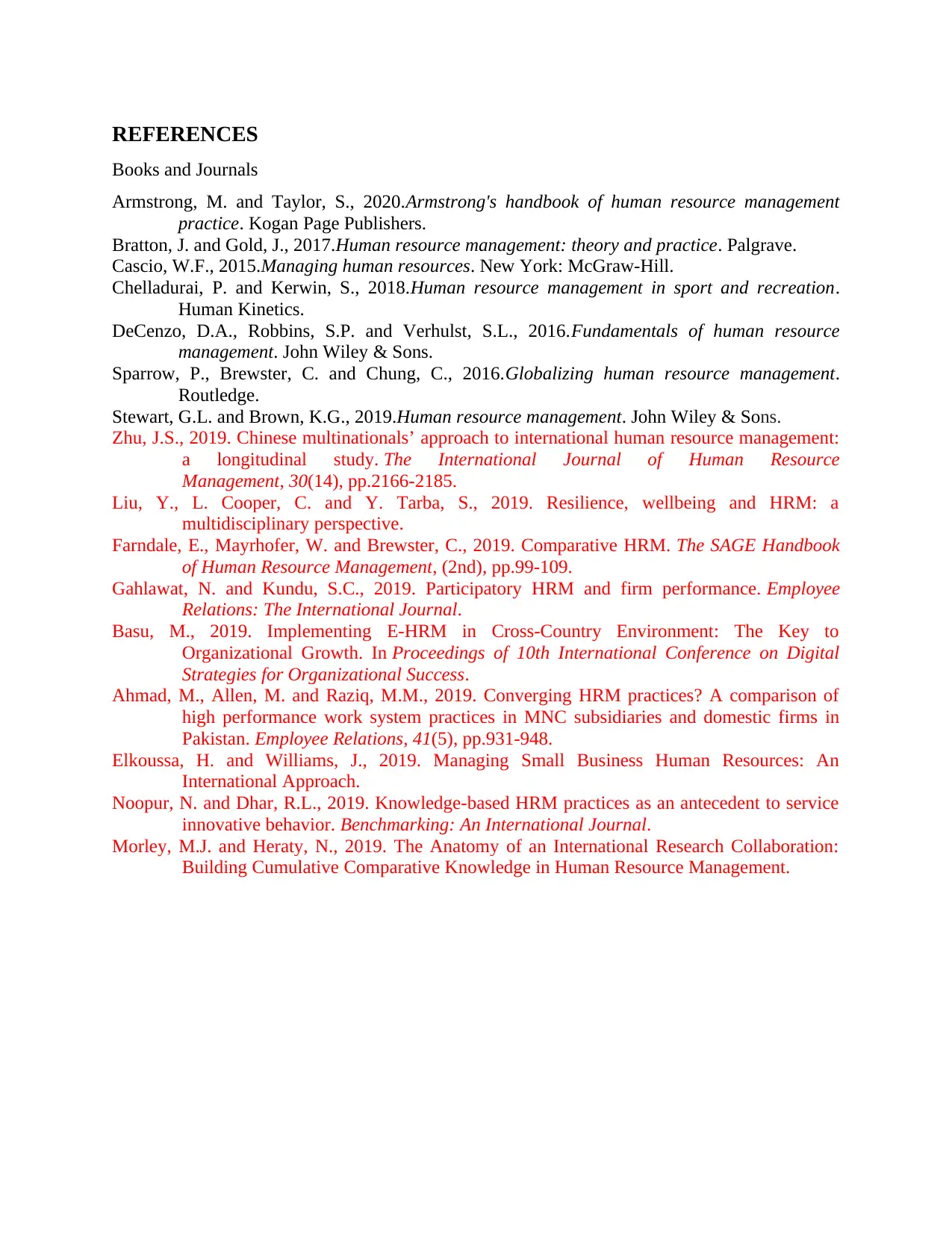
REFERENCES
Books and Journals
Armstrong, M. and Taylor, S., 2020.Armstrong's handbook of human resource management
practice. Kogan Page Publishers.
Bratton, J. and Gold, J., 2017.Human resource management: theory and practice. Palgrave.
Cascio, W.F., 2015.Managing human resources. New York: McGraw-Hill.
Chelladurai, P. and Kerwin, S., 2018.Human resource management in sport and recreation.
Human Kinetics.
DeCenzo, D.A., Robbins, S.P. and Verhulst, S.L., 2016.Fundamentals of human resource
management. John Wiley & Sons.
Sparrow, P., Brewster, C. and Chung, C., 2016.Globalizing human resource management.
Routledge.
Stewart, G.L. and Brown, K.G., 2019.Human resource management. John Wiley & Sons.
Zhu, J.S., 2019. Chinese multinationals’ approach to international human resource management:
a longitudinal study. The International Journal of Human Resource
Management, 30(14), pp.2166-2185.
Liu, Y., L. Cooper, C. and Y. Tarba, S., 2019. Resilience, wellbeing and HRM: a
multidisciplinary perspective.
Farndale, E., Mayrhofer, W. and Brewster, C., 2019. Comparative HRM. The SAGE Handbook
of Human Resource Management, (2nd), pp.99-109.
Gahlawat, N. and Kundu, S.C., 2019. Participatory HRM and firm performance. Employee
Relations: The International Journal.
Basu, M., 2019. Implementing E-HRM in Cross-Country Environment: The Key to
Organizational Growth. In Proceedings of 10th International Conference on Digital
Strategies for Organizational Success.
Ahmad, M., Allen, M. and Raziq, M.M., 2019. Converging HRM practices? A comparison of
high performance work system practices in MNC subsidiaries and domestic firms in
Pakistan. Employee Relations, 41(5), pp.931-948.
Elkoussa, H. and Williams, J., 2019. Managing Small Business Human Resources: An
International Approach.
Noopur, N. and Dhar, R.L., 2019. Knowledge-based HRM practices as an antecedent to service
innovative behavior. Benchmarking: An International Journal.
Morley, M.J. and Heraty, N., 2019. The Anatomy of an International Research Collaboration:
Building Cumulative Comparative Knowledge in Human Resource Management.
Books and Journals
Armstrong, M. and Taylor, S., 2020.Armstrong's handbook of human resource management
practice. Kogan Page Publishers.
Bratton, J. and Gold, J., 2017.Human resource management: theory and practice. Palgrave.
Cascio, W.F., 2015.Managing human resources. New York: McGraw-Hill.
Chelladurai, P. and Kerwin, S., 2018.Human resource management in sport and recreation.
Human Kinetics.
DeCenzo, D.A., Robbins, S.P. and Verhulst, S.L., 2016.Fundamentals of human resource
management. John Wiley & Sons.
Sparrow, P., Brewster, C. and Chung, C., 2016.Globalizing human resource management.
Routledge.
Stewart, G.L. and Brown, K.G., 2019.Human resource management. John Wiley & Sons.
Zhu, J.S., 2019. Chinese multinationals’ approach to international human resource management:
a longitudinal study. The International Journal of Human Resource
Management, 30(14), pp.2166-2185.
Liu, Y., L. Cooper, C. and Y. Tarba, S., 2019. Resilience, wellbeing and HRM: a
multidisciplinary perspective.
Farndale, E., Mayrhofer, W. and Brewster, C., 2019. Comparative HRM. The SAGE Handbook
of Human Resource Management, (2nd), pp.99-109.
Gahlawat, N. and Kundu, S.C., 2019. Participatory HRM and firm performance. Employee
Relations: The International Journal.
Basu, M., 2019. Implementing E-HRM in Cross-Country Environment: The Key to
Organizational Growth. In Proceedings of 10th International Conference on Digital
Strategies for Organizational Success.
Ahmad, M., Allen, M. and Raziq, M.M., 2019. Converging HRM practices? A comparison of
high performance work system practices in MNC subsidiaries and domestic firms in
Pakistan. Employee Relations, 41(5), pp.931-948.
Elkoussa, H. and Williams, J., 2019. Managing Small Business Human Resources: An
International Approach.
Noopur, N. and Dhar, R.L., 2019. Knowledge-based HRM practices as an antecedent to service
innovative behavior. Benchmarking: An International Journal.
Morley, M.J. and Heraty, N., 2019. The Anatomy of an International Research Collaboration:
Building Cumulative Comparative Knowledge in Human Resource Management.
1 out of 11
Related Documents
Your All-in-One AI-Powered Toolkit for Academic Success.
+13062052269
info@desklib.com
Available 24*7 on WhatsApp / Email
![[object Object]](/_next/static/media/star-bottom.7253800d.svg)
Unlock your academic potential
Copyright © 2020–2026 A2Z Services. All Rights Reserved. Developed and managed by ZUCOL.




